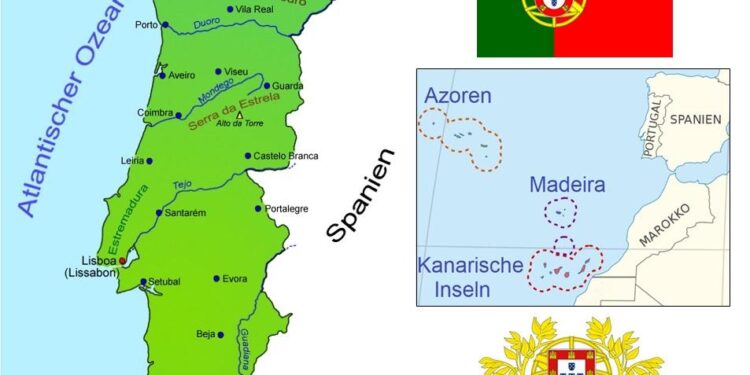Portugal has incurred a financial setback following the default on a bond issued by TAP Air Portugal, resulting in a loss of $34.4 million, according to ch-aviation reports. The state-owned airline’s failure to meet its debt obligations marks a significant blow to the Portuguese government’s efforts to stabilize the carrier amid ongoing challenges in the aviation sector. This development highlights the continuing financial strain within TAP and raises questions about the future of Portugal’s national airline.
Portugal Faces Financial Blow as TAP Bond Default Impacts National Budget
The Portuguese government has officially recorded a $34.4 million loss resulting from the default on bonds issued by TAP Air Portugal, the nation’s flag carrier. This financial blow adds pressure to Portugal’s already strained budget, contributing to concerns among fiscal policymakers about the broader economic effects. The default follows TAP’s ongoing struggles with liquidity amid the aviation industry’s turbulent recovery from the COVID-19 pandemic. As a state-owned entity, the repercussions have rippled beyond the airline, impacting public finances and fiscal stability efforts.
- Impact on national budget: The loss directly reduces government reserves allocated for strategic investments.
- Investor confidence: Market watchers express concern over potential future defaults on state-backed aviation debts.
- Economic ripple effects: Pressure on public funds may limit social spending and infrastructure projects.
| Financial Metric | Value |
|---|---|
| Loss from TAP bond default | $34.4 million |
| Previous TAP bailout (2020) | ‚ā¨1.2 billion |
| Portugal’s 2024 budget deficit target | 2.9% of GDP |
Analyzing the Causes Behind TAP’s Bond Default and Its Broader Economic Implications
The root causes of TAP’s bond default are multifaceted, reflecting both internal management challenges and external economic pressures. Key factors include liquidity constraints stemming from prolonged pandemic-related travel restrictions, which severely impacted cash flow. Additionally, TAP’s heavy reliance on government subsidies could not fully offset mounting operational costs, while increased fuel prices accelerated financial strain. Compounding these issues, structural inefficiencies in the airline’s fleet modernization strategy have delayed fiscal recovery, undermining investor confidence and precipitating the default event.
The ramifications of this default extend beyond TAP’s balance sheet, affecting Portugal’s broader economic landscape. The absorbed $34.4 million loss signals a tangible hit to public finances, placing additional pressure on government resources already stretched by pandemic recovery efforts. Economists warn of potential ripple effects such as:
- downgraded sovereign credit ratings due to increased fiscal risk
- tighter borrowing conditions for Portuguese corporates linked to state-owned entities
- heightened investor wariness in Portugal’s aviation and tourism sectors
This episode underscores the critical need for strategic reforms in state enterprise oversight to stabilize the national economy and restore market trust.
| Cause | Impact |
|---|---|
| Liquidity Shortfall | Restricted operations and cash flow |
| Fuel Price Surge | Increased operational costs |
| Inefficient Fleet Planning | Delayed recovery and investor concerns |
| Government Subsidies Limits | Insufficient financial buffer |
Strategic Recommendations for Strengthening Portugal’s Aviation Sector and Safeguarding Future Investments
To fortify the resilience of Portugal’s aviation sector against financial shocks like TAP’s bond default, a multi-layered strategic approach is essential. First, the government should enhance regulatory oversight and introduce stricter risk assessments for airline financing. This can be achieved by establishing a dedicated aviation financial risk unit within the national aviation authority. Additionally, diversifying investment sources beyond sovereign guarantees will reduce the concentration of risk tied to a single carrier. The government is also encouraged to incentivize private sector partnerships and promote increased transparency in airline financial disclosures, enabling investors to make more informed decisions.
Alongside governance reforms, targeted investments in infrastructure modernization and digital transformation are pivotal for attracting sustainable long-term capital. Key focus areas include:
- Upgrading airport facilities to handle emerging aircraft technologies and increasing passenger volumes
- Implementing green aviation initiatives to align with EU environmental standards and unlock green funds
- Enhancing training programs for workforce upskilling in advanced aeronautical maintenance and operations
| Strategic Pillar | Proposed Action | Expected Outcome |
|---|---|---|
| Financial Oversight | Dedicated risk assessment unit | Early warning of financial instabilities |
| Capital Diversification | Private sector partnerships | Reduced sovereign exposure |
| Infrastructure | Airport modernization | Increased airline competitiveness |
To Wrap It Up
As Portugal grapples with a $34.4 million loss following the default on TAP Air Portugal’s bonds, the incident underscores the financial vulnerabilities facing the nation’s flagship carrier amid ongoing industry challenges. Market watchers will be closely monitoring how both the airline and the Portuguese government navigate the fallout, as efforts to stabilize TAP continue against a backdrop of shifting economic conditions and evolving aviation dynamics. Further developments are expected to shape the trajectory of Portugal’s aviation sector in the months ahead.
















